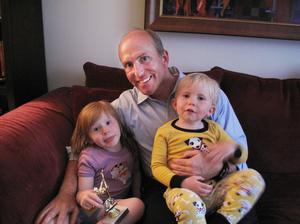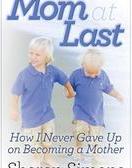B.J. Holt always wanted to be a dad. As he approached 40, with no life partner in sight, he felt a version of the ticking biological clock.

“The ‘having the children thing’ started to overwhelm the desire to have the relationship first,” Holt says. “They sort of switched on me.”
So Holt decided to go it alone. A few years ago, he used an egg donor and a surrogate to create a family of his own.
First came Christina, now 4, a strawberry-blond bundle of energy who loves to stage ballet performances in the living room of their New York City apartment.
Little brother Payson is 2, and dissolves into giggles when daddy swings him up to his shoulder for a bounce.
Challenging Stereotypes
When Holt decided to have kids, he didn’t know any other single dad by choice. But family and friends were ecstatic and supportive.
As for strangers, Holt has gotten used to their assumptions about his family. He laughs as he recalls driving through a toll booth on a recent weekend.
“There I was, in the car with my two kids in the backseat,” he says, “and I was fumbling for the money. And [the woman in the tollbooth] said, ‘Take your time, take your time. Daddy’s without the mom today!’ ” Holt says he just smiled and drove on.
Holt is gay. Steve Majors, communications director for the same-sex advocacy group Family Equality Council, says many young gay men once believed living openly gay meant not having children.
“Either you were in a heterosexual relationship and having children, or you were gay,” Majors says. “You couldn’t have both.”
But with the rise of same-sex marriage, gay men have pioneered the use of reproductive technology to have children. Majors says single gay men now email him or show up at parenting seminars, wanting to learn more about starting a family.
At the same time, gender roles for straight men are evolving. With more stay-at-home dads, and fathers generally spending more time caring for kids, advocates say men are realizing they don’t necessarily need a wife to be a parent.
Brian Tessier recently started 411-4-DAD, a hotline for prospective single fathers. “I think we probably right now are up to about 30 calls a month,” he says.

